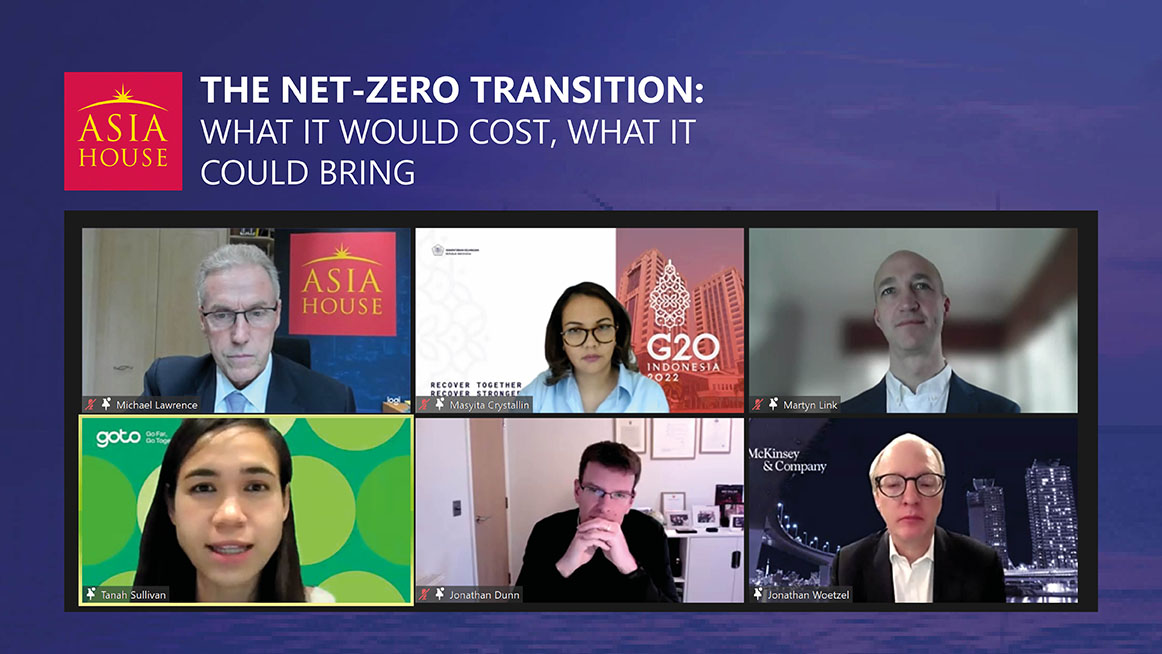Driving commercial and political engagement between Asia, the Middle East and Europe
Driving commercial and political engagement between Asia, the Middle East and Europe
Driving commercial and political engagement between Asia, the Middle East and Europe

Hitting a target of net zero emissions by 2050 will require global spending of US$275 trillion, a new McKinsey & Company report says, prompting calls for more financial help for fossil fuel-producing and developing countries.
Jonathan Woetzel, Director of the McKinsey Global Institute and an author of the report, told an Asia House event that average spending of US$9.2 trillion a year between 2021 and 2050 would help limit global warming to 1.5 C. The costs would be frontloaded over the next decade.
WATCH THE DISCUSSION IN FULL BELOW
Woetzel said the transition required extensive changes to all energy and land-use systems. He also said the impact of the changes would be uneven, with poorer countries and those dependent on fossil fuel production most exposed and spending a share of economic output up to 1.5 times more than advanced economies.
Given this disparity, developing countries, including in Asia, have called on advanced economies to help them fund the transition.
Masyita Crystallin, special advisor to the Indonesian Finance Minister, told the Asia House audience her country faced high costs in activities such as disposing of coal-fired power plants.
“In the case of coal, we need to make the transition carefully and affordably”, she said, adding that advanced economies should offer cheap financing.
Indonesian entities have issued green bonds, which are meant to fund projects to improve the environment. It is also a major oil producer and, according to Reuters, plans to increase production in 2022.
“This transition finance and transition activity has to be acknowledged by the global community if we want to make it happen,” Crystallin said.
“We would like to invite the private sector to do more but it cannot be done without a fair return. That is why we are providing blended financing” including government funds.
Martyn Link, Chief Strategy Officer at engineering company Wood, said that while businesses are committed to the transition, there are also concerns about making a fair return.
He said there would be money for “bankable” projects, but added it was clear major emitters such as India and China would have to continue to invest in coal.
“The biggest challenge we have is around global solidarity. Will the world be able to think and act as one or will it fragment and everybody look after their own interest?” he asked.
“There needs to be incentives and penalties and we need to get that balance right.”
Tanah Sullivan, Group Head of Sustainability at Indonesia’s GoTo Group, echoed the call for cooperation over competition.
“To us, it is very much a pre-competitive space. We are trying to solve the same challenges as other companies in our industry and others. Why not do it together?”
Jonathan Dunn, Head of International Policy and UK Government Relations at mining company Anglo American, said his industry involves massive investments over many years. Some technologies to aid mining’s decarbonisation effort exist but others are still being developed.
Dunn added that the transition to net zero would not happen without cobalt, copper and other minerals that still needed to be mined.
Woetzel of McKinsey Global Institute said all stakeholders, public and private, need to join a dialogue on how the transition could be achieved.
“Every business, whether it is facing a dislocation of demand or a rising need for capital, investments, needs to incorporate climate and net zero transition into their thinking.”
This would require some changes in governance.
“The transition is unlikely to happen without some transformation of governance at a regional and, potentially, global level around the flows of capital and incorporating the transition into it. And it is of course within every country and every community to address the unevenness and front-loaded nature of the transition.”
The discussion, held in partnership with McKinsey & Company on 26 January, was moderated by Asia House Chief Executive Michael Lawrence.
JOIN OUR MAILING LIST to receive Asia House insights, analysis and research direct to your inbox.
